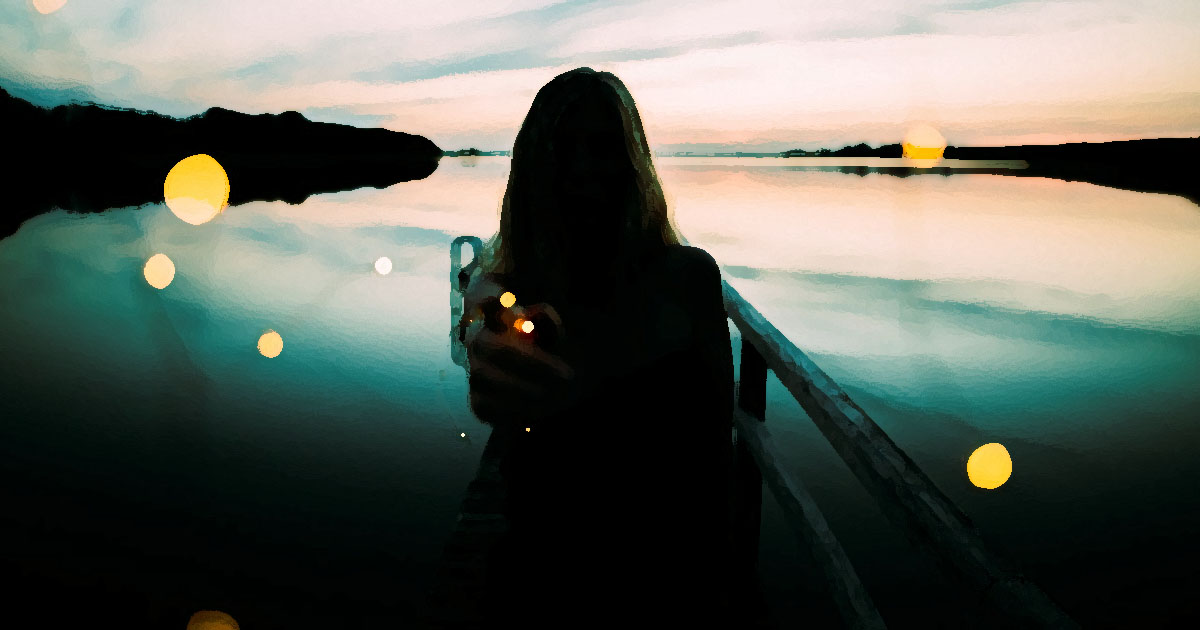THE LADY IN THE LAKE
★ ★ ★ ★
FICTION

By Isha Ro
Over the valley and across the bridge, past Herr Dalmann’s apple orchard and down a narrow dirt path, stands a beautiful lake in an idyllic little town called Schönbrunn. Winters in Schönbrunn are long and bleak, but summer is magic and the most magical time is spent by the lake, where swans glide arrogantly on the water, children create a pleasant havoc and adults swim or paddle their boats or soak up the sun while the fish nibble their toes.
But there is another side to Schönbrunn lake. And the sun never seems to shine there. No birds ever seem to sing. There’s no paddling, no swimming, and the fish that would nibble your toes are floating belly up on the surface of the putrid water. On this side of the lake, only the willows flourish, their heads bent with weeping. The water, so sparkly and translucent just a glance away, is murky and muddy. It hides things.
It is haunted, they say, by a lady who appears from the water and takes you away. Some said she seduced you into the depths, others that she pleaded with you for help by the shore, yet others that she grabbed you and forced you under. The stories said she held you under until you drowned and used your soul as her plaything. That she enslaved you to do her bidding until your corpse rotted away and she needed to find another. That she consumed you bit by bit, every bite a searing pain until there was nothing left of you at all. Ghost stories, these were, meant to scare small children into compliance. Until six years ago, that is, when the girls started disappearing.
They were heading home from school, off to buy bread at the bakery, taking peaches to their grandmothers’, but as night fell and the sun rose again, their beds remained unslept in, their dinners uneaten—they were gone. And as the townsfolk searched for them high and low, all that was left was their clothes—still damp with river water mingled with blood—strewn carelessly on the shores of the lake.
Freya Leiter didn’t believe in ghost stories. She thought these were the tales of small-minded people who were stuck in the rut of their small-town lives. And despite the bloody clothes found by the lake, Freya was sure that, if The Lady did exist, she’d take you on a magical adventure, to the depths of Atlantis, to swim with mermaids and hunt for treasures in the deep. Freya had to believe that there would be an escape from this too small, too dank, stifling little town where nothing ever happened and nothing ever would.
The girls who disappeared all had one thing in common, something that Freya wished she had: a chance at freedom. They were all poised to leave Schönbrunn behind—betrothed to rich men in bigger cities, being sent to wealthy dowager Aunts abroad to learn art and culture, allowed to study at the university or at boarding schools in France. They would celebrate in the summer—one last summer in Schönbrunn—before starting off on a new adventure, leaving this little town behind…only to be lost to the murky depths of The Lady’s lair.
Freya’s family did not have the money to send her away. At seventeen and the eldest of eight siblings, they could not do without her help around the house and the extra hand on the pig farm. Her only moments of peace—the only time she had to herself—was when she came to The Lady’s lake to paint. Only there could she escape into the deep, rich hues she flung across her canvas, made from her own special blend of colors. One painting for each of the girls who were taken, presented to their families as a focus for their loss, their pain and grief displayed on canvas.
Freya ventured to the lake at every possibility, resting her back against a large rock, sketching and drawing in her little notebook or painting on her canvas and dreaming her big dreams. Of her art hanging in the major galleries in Berlin, New York and London, instead of on the walls of her small town neighbours. Of going to swanky parties with all the right people, instead of playing house with seven kids she had no hand in creating. Of being kissed by strong and handsome men instead of expected to marry the first butter-churner who asked her father for her hand in marriage. Freya didn’t believe in the ghost stories of the lake, yet she secretly hoped that something would happen. But nothing ever happened.
Until one day, it did.
It was a normal summer day in Schönbrunn, much like any other. Freya was sitting on the bank of the lake, her fingers around a charcoal pencil, her thoughts a few worlds away. She was thinking about Agata, the baker’s daughter, who was leaving Schönbrunn to work as an au pair for a family in Sweden. Freya was angry. Once again, she was being left behind. Once again, someone had an opportunity that she would never have. Blinded by her angry tears, she didn’t notice the water beginning to ripple or the willows stretching their tendrils out in warning. She didn’t notice the figure slowly wending its way out of the lake, over the stones, until The Lady was almost upon her.
You might expect a creature from those stale waters to be an unholy thing, with blackened eyes, patchy skin and hair like seaweed, lank and brown and filmy to the touch. But no. What Freya saw was a thing of beauty. Almond-shaped eyes of deep sea green, curls that coyly peeked from behind her back, dewy skin the color of bitter chocolate. I should be afraid, Freya thought, but she was not. A thrill of excitement played on her neck, goosebumps rising on her pale, freckled arms.
She reached her hand out to The Lady, impatient to touch her, mesmerized by the promise of whatever was to come, ready to be whisked away. The Lady smiled at her as she drew nearer, bright white teeth slightly hidden between two ripe and juicy lips.
“Freya,” she breathed, her voice floating through Freya’s body like smoke.
“Yes,” Freya replied. Not a question; an agreement.
The Lady sat beside her, examining her the way you do a beautiful fruit into which you are eagerly about to bite. She leaned forward and kissed Freya on the mouth, her lips warm and sweet and slightly tangy, like cinnamon and honey. As their lips touched, Freya felt like she was falling into one of her paintings. Her world exploded in color: warm reds and burnt oranges, bursts of yellows, hot colors, colors of fire. Colors of blood. Her body burned deliciously as The Lady’s hands wandered where they pleased, creating more heat and fire wherever they touched. She tastes like wildflowers, Freya thought. And of distant places and adventure and things I should not do, but that I will.
But that is not what The Lady saw.
What The Lady saw was a dead and broken soul, hollowed out by jealousy. She saw the fear of being left behind hardened like coal in Freya’s chest. She glimpsed the spilling of youth and blood, the dance between two lovers: knife and flesh. She saw envy squeezing life from delicate throats just as the hands of a jealous lover had stolen her own last breath. She tasted Freya’s thrill for murder.
She watched the trusting smiles of teenaged girls distend with horror as a blade ripped, as the rope tightened; bodies dragged through mud and buried in the stomachs of pigs. She saw the blood of a little girl’s victims splashed on a canvas, mixed into oils, hanging on the walls of the families left behind. She saw weeping mothers and angry fathers wondering what had become of their precious daughters. She saw Freya place hands of comfort on the bereaved, the blood of the murdered still under her nails. The Lady saw all this and she was afraid. We warned you, the willows whispered as they solemnly shook their heads. We told you to stay in the water.
But she had not listened.
She pulled back sharply from the embrace, her eyes wide with horror, her hair writhing and shaking about her head. Freya grabbed her by the arm, her hot breath rushing through clenched teeth, “Take me! Take me with you!” But The Lady shook her head as she crawled, trembling, back towards her sanctuary, never losing sight of the evil before her, until her head sank once again beneath the cloudy water that rippled and bubbled until it was calm again.
Freya was red with fury. She stood by the rock, her hands balled into fists, watching the sun sink and fizzle into the water. Why, she thought, is it never my turn?! How she would have liked The Lady’s blood for her canvas right then, but one cannot kill a thing already dead.
Just then she heard the clock in the village strike seven times. It was time to get going, she shouldn’t linger. Agata was leaving for Sweden in the morning. There was to be a small celebration, a quiet goodbye far away from The Lady’s lake. Freya smiled in anticipation, her blood cooling from a boil to a simmer. Let The Lady be damned. Agata would be one of her greatest masterpieces. A rich and vibrant work of art, awash with life and color, just like the girl herself. And when the time was right, she would present it to the poor girl’s mother to remind her of the daughter she had lost. Her pain and grief displayed on canvas for all the town to see.

Isha Ro is a Jamaican writer running on a corporate hamster wheel in the East side of Berlin. She lives with a large Czech, an oversized stuffed monkey and an imaginary Golden Retriever. You can read more of her work at theprosateur.com
























Brilliant….. absolutely beautiful story.
Thank you, beautiful stranger!
Wow